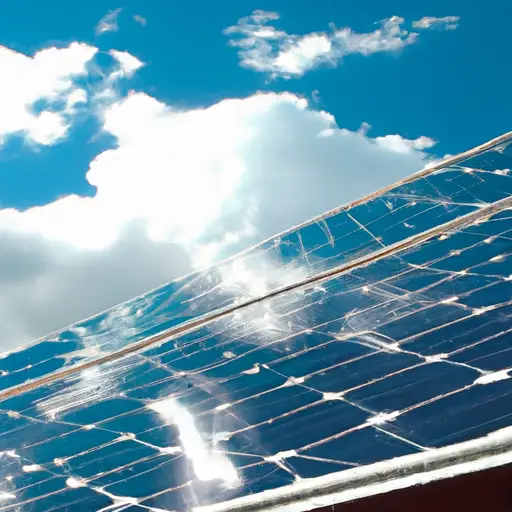Have you ever wondered if solar panels make any noise? It seems like a strange question, but when you’re considering switching to solar energy and living off the grid, every little detail matters. You might be worried about the potential noise pollution from the panels, especially if you’re planning to install them on your roof. Well, let me put your mind at ease: solar panels are virtually silent.
Contrary to popular belief, solar panels do not make any noise. They are not like wind turbines or generators that produce audible sounds. In fact, once your solar panels are installed, you won’t even notice they’re there. They quietly absorb sunlight and convert it into electricity without making a single peep. It’s like having your own little power station on your roof, silently working to generate clean energy for your home.
So, how exactly do solar panels work without making any noise? Well, the secret lies in their design. Solar panels are made up of photovoltaic (PV) cells that are responsible for converting sunlight into electricity. These cells are made of a semiconductor material, usually silicon, which creates an electric current when exposed to sunlight. The process of generating electricity from sunlight is completely silent, without any moving parts that could create noise.
In conclusion, if you’re worried about noise pollution from solar panels, you can rest easy. They are completely soundless and won’t disturb the tranquility of your home. In fact, their silent operation is one of the many benefits of using solar energy. In the upcoming article, we’ll explore more of the advantages of solar panels and why they’re a great choice for sustainable living. So, stay tuned and get ready to learn more about the fascinating world of solar energy!
Living off grid
Living off the grid has become an increasingly popular lifestyle choice for many individuals seeking greater self-sustainability and reducing their environmental footprint. By disconnecting from the traditional power grid, off-grid living allows individuals to generate their own electricity, typically through renewable energy sources such as solar panels. One common concern that people have when considering this lifestyle is the noise generated by solar panels. In this article, we will debunk the myth of noisy solar panels and provide you with a comprehensive understanding of how solar panels operate and their impact on the surrounding environment.
Benefits of living off grid
Living off the grid offers numerous benefits, both for individuals and the environment. The primary advantage is the independence it provides from utility companies and the associated costs of electricity. By generating your own power, you can significantly reduce or eliminate monthly utility bills. This is especially true with solar panels, as the sun’s energy is free and abundant.
Moreover, off-grid living promotes a more sustainable and environmentally friendly lifestyle. Solar panels produce clean energy, unlike fossil fuels which contribute to air pollution and greenhouse gas emissions. By utilizing solar energy, you can significantly reduce your carbon footprint and contribute to a greener future for our planet.
How solar panels are used in off grid living
Solar panels play a crucial role in off-grid living by serving as the primary source of electricity. These panels consist of photovoltaic cells that convert sunlight into usable energy. This process, known as the photovoltaic effect, allows solar panels to harness the sun’s energy and convert it into electricity.
To effectively use solar panels in an off-grid setting, a comprehensive solar panel system is necessary. This includes not only the panels themselves but also other components such as inverters, batteries, and charge controllers. The panels collect sunlight, while the inverter converts the direct current (DC) electricity generated by the panels into alternating current (AC) electricity that can be used to power household appliances. The batteries store excess electricity for use during periods with limited sunlight, providing a continuous supply of power.
Overall, solar panels are a reliable and efficient solution for off-grid living, offering both financial and environmental benefits.
The Myth of Noisy Solar Panels
Common misconception about solar panels and noise
One of the most common misconceptions about solar panels is that they generate noise during operation. This myth has dissuaded many individuals from considering solar energy as a viable option for off-grid living. However, the truth is that solar panels are completely silent in their operation. Unlike other renewable energy sources such as wind turbines, which can produce audible noise due to the rotation of the blades, solar panels do not have any moving parts that could generate noise.
Exploring the origin of the myth
The myth of noisy solar panels likely originates from a misunderstanding of the various components involved in a solar panel system. While other components such as inverters or batteries may produce a low humming sound, the solar panels themselves do not contribute to any noise pollution. This misconception may have been perpetuated by individuals who have confused the noise generated by these ancillary components with the actual solar panels.
It is essential to differentiate between the different elements of a solar panel system to understand that solar panels themselves are completely silent. By dispelling this myth, individuals can make informed decisions when selecting their preferred renewable energy source.
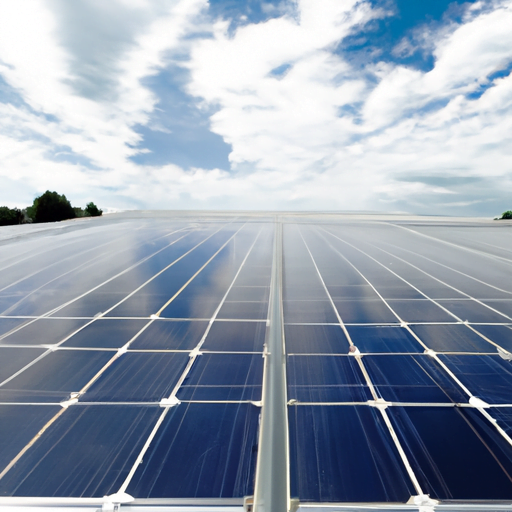
Understanding Solar Panel Operation
How solar panels convert sunlight into electricity
To better understand why solar panels do not produce noise, it is crucial to comprehend how they convert sunlight into electricity. Solar panels consist of multiple photovoltaic cells connected in a series and encapsulated within a protective glass or plastic layer.
When sunlight strikes these cells, it excites the electrons within the semiconductor material, which creates an electric current. As each cell generates a small amount of electricity, multiple cells are connected to create a solar module or panel capable of producing a significant amount of power.
This process of converting sunlight into electricity is a silent operation that relies on the inherent properties of the semiconductor materials within the solar cells. There are no moving parts or mechanical components involved, ensuring a noiseless generation of electricity.
Components of a solar panel system
A solar panel system comprises several components that work together to generate, store, and distribute electricity. These components include:
- Solar panels: The primary component that captures sunlight and converts it into electricity.
- Inverter: Converts the DC electricity generated by the solar panels into AC electricity that can be used by household appliances.
- Batteries: Store excess electricity generated by the panels for later use, ensuring a continuous power supply even during periods of limited sunlight.
- Charge controller: Regulates the flow of electricity from the solar panels to the batteries, preventing overcharging and optimizing battery performance.
These components work harmoniously to provide a reliable and self-sustaining power source for off-grid living. Together, they ensure the efficiency and effectiveness of the solar panel system, without generating any noise.
Why solar panels are silent in operation
The main reason why solar panels are silent in operation is their lack of moving parts. Unlike wind turbines or even traditional fossil fuel power plants, solar panels do not require any mechanical components to generate electricity. This absence of moving parts means that solar panels do not produce any sound during their operation.
Solar panels rely solely on the photovoltaic effect and the interaction between sunlight and the semiconductor materials within the cells. As long as sunlight is available, solar panels will silently convert it into usable electricity, making them an ideal choice for those seeking a quiet and sustainable energy source.
Factors Affecting Noise Levels
Examining situations where solar panels may produce noise
As mentioned earlier, solar panels themselves do not produce any noise. However, certain situations involving ancillary components of the solar panel system or improper installation practices may lead to noise generation. These situations are rare and can be easily avoided with proper maintenance and installation procedures.
For example, inverters or charge controllers may produce a low humming sound during their operation. This noise is typically minimal and confined to the area where these components are installed, such as an equipment room or basement. In most cases, this noise is negligible and does not pose any significant disturbance.
Identifying potential sources of noise in solar panel systems
In addition to inverters or charge controllers, other components within a solar panel system may contribute to noise generation if not installed or maintained properly. Loose or improperly secured mounting brackets, wiring, or junction boxes may vibrate or rattle, potentially creating a noise nuisance. However, these issues can easily be addressed through routine maintenance and inspection of the solar panel system.
It is essential to note that these sources of potential noise are limited to the ancillary components of the solar panel system and not the solar panels themselves. With proper installation and regular maintenance, any noise associated with solar panel systems can be minimized or eliminated entirely.
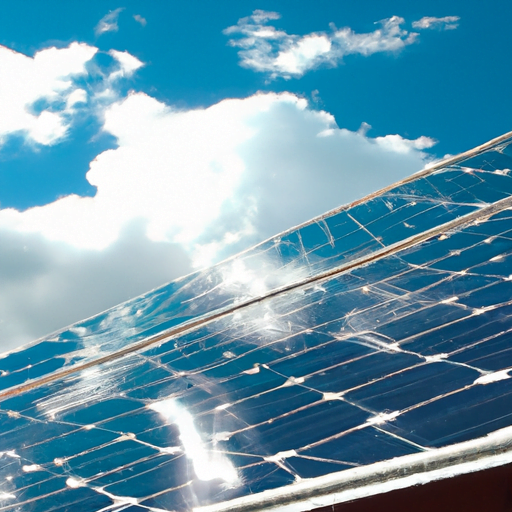
Noise Complaints and Resolution
Addressing concerns about noise pollution
Despite solar panels being silent in operation, concerns about noise pollution may arise from those considering the installation of renewable energy systems. These concerns often stem from misconceptions and inaccurate information, contributing to a negative perception of solar panels.
To address these concerns, it is essential to educate the public about the true nature of solar panels and their noiseless operation. By dispelling the myth of noisy solar panels through accurate information and open communication, potential adopters of solar energy can make informed decisions based on facts rather than misinformation.
Potential solutions to minimize or eliminate noise
If individuals do experience noise issues associated with their solar panel systems, potential solutions can be implemented to minimize or eliminate any noises generated. Regular maintenance and inspection of the solar panel system, including tightness checks on mounting brackets, wiring, and junction boxes, can prevent any potential sources of noise. Additionally, utilizing professional installation services and high-quality materials can help ensure a quiet and efficient solar panel system.
It is crucial to address any noise concerns promptly to maintain the enjoyment and benefits of living off the grid. By taking proactive measures, individuals can optimize the performance of their solar panel systems while maintaining a noise-free environment.
Impact on Surrounding Environment
Assessing the effect of solar panel noise on wildlife
Solar panels, being silent in operation, have a minimal impact on the surrounding environment and wildlife. The absence of noise pollution makes solar panels particularly appealing in areas with sensitive ecosystems or wildlife habitats.
Unlike other renewable energy sources, such as wind turbines, which can disrupt bird migratory patterns or generate audible noise that may disturb wildlife, solar panels operate without any significant impacts on local fauna. The lack of noise pollution allows wildlife to thrive undisturbed, promoting a balanced and harmonious environment.
Environmental benefits of solar energy
Solar energy, generated by solar panels, offers significant environmental benefits compared to fossil fuel-based electricity generation. Solar panels produce clean, renewable energy without emitting any harmful pollutants or greenhouse gases. This reduces the dependence on fossil fuels, combats climate change, and improves air quality.
By utilizing solar panels and transitioning to renewable energy sources, individuals contribute to a greener and more sustainable future for our planet. The environmental benefits of solar energy extend beyond noise levels, encompassing various aspects of sustainability and ecological preservation.
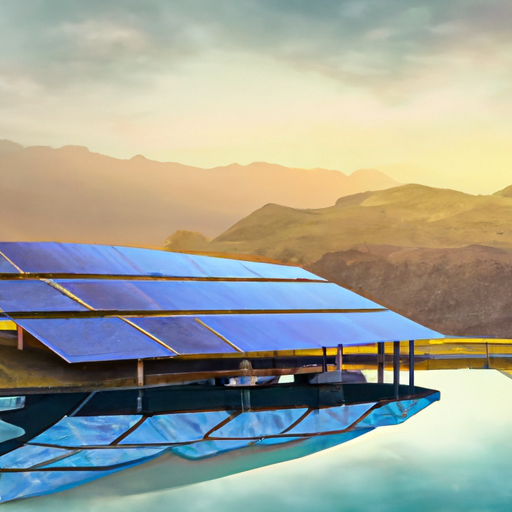
Noise Reduction Techniques
Methods for reducing noise in solar panel installations
While solar panels themselves do not generate noise, there are methods to further reduce or eliminate any potential noise associated with ancillary components.
- Proper installation: Ensuring that all components are securely mounted, wired, and aligned can minimize vibrations and rattling that may lead to noise generation.
- Sound barriers: Using acoustic materials or sound-absorbing panels in equipment rooms or basement areas can help minimize noise propagation from inverters or charge controllers.
- Insulation: Incorporating insulation materials in the surrounding areas where ancillary components are located can absorb any noise generated, further reducing potential disturbances.
By implementing these noise reduction techniques, individuals can enjoy the benefits of solar energy without any unwanted noise interruptions.
Incorporating sound barriers and insulation
In addition to the techniques mentioned above, sound barriers and insulation can be included in the initial design and installation process of a solar panel system. By strategically placing sound-absorbing materials around the potential sources of noise, individuals can create a more acoustically controlled environment.
For instance, equipment rooms or basement areas can be designed to incorporate specialized soundproofing materials and insulation, ensuring that any noise generated by the ancillary components of the solar panel system is contained within these spaces.
By proactively considering sound barriers and insulation during the installation phase, individuals can create a noise-free environment while benefiting from the advantages of living off the grid.
Comparing Solar Panels with Other Renewable Energies
Comparing noise levels of solar panels with wind turbines
When it comes to comparing noise levels, solar panels have a significant advantage over other renewable energy sources, such as wind turbines. Wind turbines rely on mechanical components, including rotating blades and generators, which can generate audible noise during operation.
In contrast, solar panels do not have any moving parts and, therefore, do not produce any noise during their operation. This noiselessness makes solar panels particularly appealing in residential areas or locations where noise pollution may be a concern.
Contrasting solar panels with other alternative energy sources
In addition to wind turbines, other alternative energy sources, such as hydropower or geothermal energy, also have their unique noise considerations. Hydropower can generate audible noise due to the flow of water through turbines, while geothermal energy may produce low-frequency vibrations from underground drilling and steam release.
Solar panels, once again, stand out as a silent alternative energy source, making them suitable for a wide range of environments and applications. This noiseless operation contributes to the overall appeal and versatility of solar panels in both urban and rural settings.
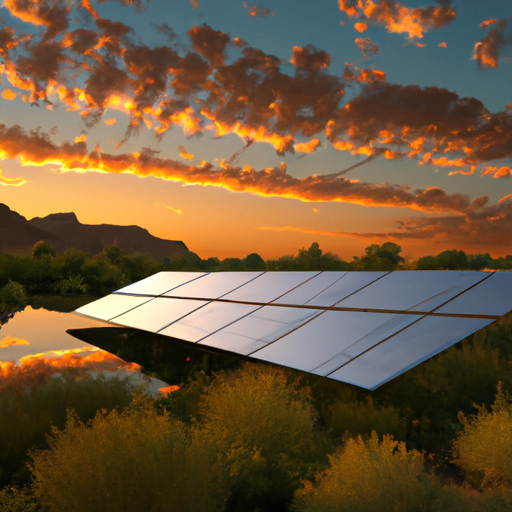
Reputation and Public Perception
Influences on public opinion about solar panel noise
The misconception of noisy solar panels has a significant influence on public opinion and the decision-making process of individuals considering renewable energy options. Misinformation and misconceptions contribute to a negative perception of solar panels, creating barriers to their broader adoption.
It is crucial to promote accurate and reliable information about solar panels to overcome these negative perceptions. By providing accurate information and debunking the myth of noisy solar panels, individuals can make informed choices aligned with their preferences and needs.
Challenging misconceptions and promoting accurate information
Educational campaigns, media outreach, and public awareness initiatives play a vital role in challenging misconceptions surrounding solar panel noise. By disseminating accurate and reliable information, individuals can better understand the true nature of solar panels and their silent operation. This, in turn, can help dispel fears and concerns related to solar panel noise and foster a greater public acceptance of solar energy.
Promoting accurate information is crucial in the transition towards a sustainable and cleaner energy future. By debunking myths and acknowledging the silence of solar panels, we can encourage the adoption of solar energy as a practical and noiseless solution.
Conclusion
Solar panels offer a noiseless and efficient solution for off-grid living, debunking the myth of noisy solar panels. Their silent operation, lack of moving parts, and environmental benefits make them an ideal choice for those seeking self-sustainability and a greener lifestyle. By understanding the mechanisms behind solar panel operation, differentiating between components of a solar panel system, and addressing concerns about noise pollution, individuals can confidently embrace the sound of silence that accompanies solar energy. Through accurate information and promotion of the many advantages of incorporating solar panels, we can encourage a broader adoption of this clean and sustainable energy source, paving the way for a brighter, quieter, and greener future.

